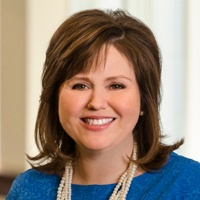
Many are often surprised when, after a loved one settles into Lyndon House, they notice significant improvements in their loved one’s well-being.
Bryan Berman, Household Coordinator for Lyndon House, shared, “Some of the families I have worked with actually second guess the move within the first month because their loved one is doing much better than they were at home.”
Lyndon House is a newly opened state-of-the-art assisted living household within Episcopal Church Home (ECH), a continuing care retirement community (CCRC) in Louisville's beautiful Graymoor-Devondale neighborhood. This household provides various levels of care and assists residents with activities of daily living, such as dressing, meal preparation, and medication management. The community features apartment-style private rooms, spacious common areas, a beautiful outdoor patio, meals prepared in a restaurant setting called Grille 75, and a chapel for worship services.
More energy to enjoy life!
Older adults often “bounce back” when care needs are met and they are no longer living alone. Berman reassures families that improvements in independence are due to their wise decision to move their loved one into a community that can provide the necessary care. “We all have limited energy, and when you have help with the day-to-day tasks, you can use your energy to enjoy life!” he said.
Berman’s insights are rooted in the experiences of countless older adults who have moved into supportive environments. Moving into assisted living can increase independence; when care needs are managed, older adults regain the energy required for other activities. Here are some ways assisted living promotes independence:
Related Blog: What is Assisted Living?
- Access to Assistance: Communities like Lyndon House at ECH provide help with daily activities such as bathing, dressing, medication management, and meal preparation. With these tasks taken care of by the team at the Lyndon House, residents can save energy for more enjoyable activities. For instance, instead of planning, shopping, cooking, and cleaning up meals, residents enjoy great food and the company of their neighbors.
- Safety and Security: Assisted Living communities have safety features like grab bars, emergency call systems, and 24/7 staff availability. Knowing help is readily accessible can give residents the confidence to engage in activities they might otherwise avoid due to safety concerns, such as walking around the lovely handicap-accessible path outside the Lyndon House or enjoying a refreshing glass of lemonade on the patio where help is a call away if needed. Residents at Lyndon House also have a call light pendent to call for assistance.
- Social Engagement: Assisted living communities offer numerous social activities and opportunities to connect with peers. Social interactions can enhance self-esteem, reduce feelings of isolation, and foster a sense of belonging and purpose. Cathy Crask's sister, Donna, has thrived since moving into Lyndon House about a year ago. “She especially enjoys social time with her new friends, exercising regularly, and simply being with friends has greatly improved her mental and physical health.”
- Health Monitoring: Health monitoring services are provided, including regular check-ups and medication management. Staying on top of their health enables residents to manage or prevent health issues more effectively, helping them maintain their independence longer. “Many of our families share that when their mom lived at home, she would forget to check her blood pressure or take her medication on time. Our team is here to help with those tasks as well,” said Berman.
- Customized Care Plans: Care plans are tailored to each resident’s needs and preferences. This personalized approach empowers residents to maintain control over their daily routines while receiving the support they need to thrive. Residents who live at Lyndon House have a choice in their day. They decide when they wake up, dine, and what events and programs they want to attend. Donna Crask shared that the team does a great job planning events. “I have never been much for crafts, but some of the residents really enjoy them. The beauty is we get to choose what we want to do.”
- Freedom from Home Maintenance: Moving into an assisted living community often means leaving behind the burdens of homeownership, such as maintenance, yard work, and household chores. This freedom allows residents to focus their time and energy on activities they enjoy, promoting greater independence. Berman shares that no one has ever complained about someone cutting the grass and cleaning the gutters for them! Residents enjoy helping with selecting seasonal flowers and decorating but are content with allowing our team to do the “heavy lifting.”
Related Blog: How Assisted Living Transformed My Sister (and Me!)
Energy is like hours in the day – we only have so much. When a caring team of professionals does your care needs and logistics of living, you have the energy to truly LIVE. Moving into an assisted living community offers a supportive environment that enhances independence by striking the right balance between assistance and autonomy tailored to individual needs. Once basic health, medical, and social needs are met, residents can truly flourish. It might seem counterintuitive, but receiving the proper assistance can actually make an older adult more independent!
To learn more about how Lyndon House can help your loved one regain their independence or to schedule a tour of ECH, contact Elizabeth Pace at (502) 273-5481 or email her at epace@erslife.org. Discover the difference that personalized care and a supportive community can make.
View our floor plans here:












